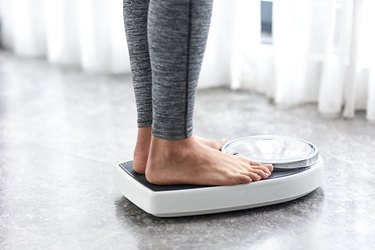
Eating the proper number of calories can help you maintain your weight. No one number of calories per kilogram is appropriate for everyone; a number of factors, including age, gender and activity level, affect calorie needs.
A few formulas can help you estimate your needs, however, if you use them as a starting point to determine the right number of calories per kilogram for you.
Video of the Day
Video of the Day
Tip
Most adults need between 26.4 to 39.6 calories per kilogram of body weight. Your specific number depends on your age, gender, activity and body composition. Use a calorie calculator to determine your needs.
Typical Calorie per Kilogram Needs
Calorie needs per kilogram vary by activity level, with people typically needing between 12 and 15 calories per pound if they're sedentary, 14 to 17 calories per pound if they're moderately active, and 16 to 18 calories per pound if they're very active. Women are at the lower end of this range, and men are at the higher end.
This translates to people needing somewhere between 26.4 and 39.6 calories per kilogram to maintain their weight, depending on gender and activity level. You've probably heard that burning 3,500 calories equals 1 pound of weight loss. To lose 1 kilogram of body weight, you would need to create a deficit of about 7,700 calories.
Calculating RMR to Estimate Calories
For a more individualized estimate of your calorie needs per kilogram, you can calculate your resting metabolic rate, or RMR, and multiply it by the appropriate activity factor.
For men, RMR equals 88.362 + (4.799 x your height in centimeters) + (13.397 x your weight in kilograms) - (5.677 x your age).
For women, it is 447.593 + (3.098 x your height in centimeters) + (9.247 x your weight in kilograms) - (4.33 x your age).
Next, multiply this number by activity factor. This is 1.2 for sedentary people, 1.375 for people who participate in light activity and 1.55 for those who are moderately active. People who are very active should multiply their RMR by 1.75, and those who have physical jobs as well as being very active should use 1.9.
You can divide the result by your weight in kilograms to get the number of calories per kilogram you should consume to maintain your current weight.
Read more: Daily Recommended Caloric Intake for Women
Effect of Exercise on Calories
Aerobic exercise burns a significant amount of calories, increasing calorie needs. For example, a man between the ages of 30 and 59 who weighs 75 kilograms would need about 34 calories per kilogram if he wasn't very active, about 40 calories per kilogram if he was active, and about 47 calories per kilogram if he was very active.
The more intense the exercise, the more calories you'll burn per minute and the greater your calorie needs. Running at a 10-minute-mile pace burns about 0.28 calorie per minute per kilogram, while walking at a 15-minute-mile pace only burns about 0.08 calorie per minute per kilogram. Aim for 30 to 60 minutes of moderately intense aerobic exercise most days of the week.
Although strength-training exercise doesn't burn a lot of calories, it can increase your calorie needs because it helps build muscle, which boosts your metabolism. Try to fit in at least two strength-training sessions per week.
Body Composition Considerations
As you get heavier, you tend to need fewer calories per kilogram to maintain your weight, even at the same activity level. This is because heavier people tend to have more body fat, and it takes fewer calories to maintain fat than muscle.
A 30-year-old man who weighs 50 kilograms and isn't very active needs about 42 calories per kilogram, but a similar man weighing 90 kilograms would only need about 31 calories per kilogram.
Because the different ways to estimate your calorie needs don't take into account whether weight comes from fat or muscle, they may underestimate calorie needs for people who have more muscle than average, such as body builders or elite athletes.
Read more: What is a Good Body Fat Percentage?
Effect of Aging on Calories
People tend to gain fat as they get older, at least in part due to the slowing down of their metabolism. This means that as you age, you'll need fewer calories per kilogram to maintain your weight. Continuing to eat the same number of calories will lead to weight gain. Every 10 years, you'll need to eat about 150 fewer calories per day to avoid this potential weight gain, according to the American Council on Exercise.
Participating in strength-training workouts to build muscle may help limit these declines, which may be at least partly due to declines in muscle mass and increases in fat mass. Muscle takes more calories to maintain than fat.